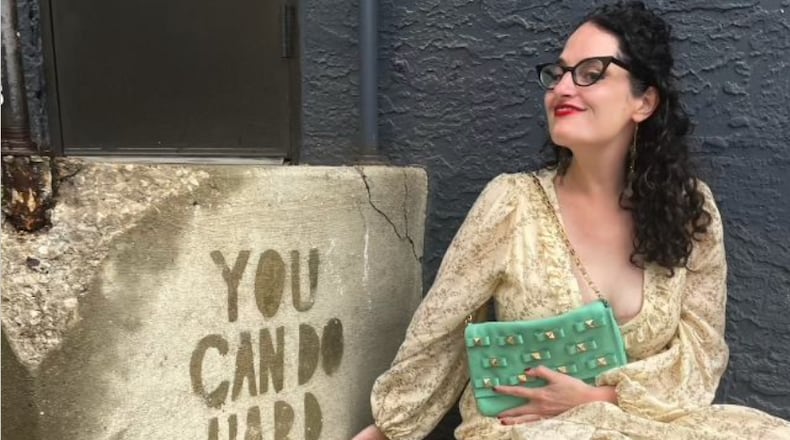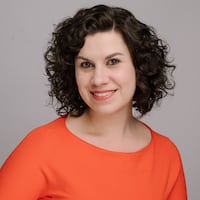“I took it seriously and went straight in. Within a week and a half I was scheduled for a double mastectomy.”
Papadakis was diagnosed Stage 1 Triple-Positive, which can be cured when detected early. Part of her decision to undergo a double mastectomy was that the doctors found a “microscopic, probably years-out second spot. I felt like they were time bombs and I wanted them off my body.”
“There are plenty of women who decide to do just a lumpectomy and are fine for years. It’s very personal but it’s important to ask the questions.”
Grateful for her recovery, she pushes the phrase “Stage Four Needs More”. “A lot of us survivors feel like we are here to keep pushing and here to fight for earlier detection and hoping other women listen to their bodies.”
Credit: Contributed
Credit: Contributed
Raising awareness
One way Papadakis is advocating is by working with Know Your Lemons, a GenZ-geared cancer awareness organization. She also gives yearly to the Young Survival Coalition, an international organization focusing on young adults ages 40 and under diagnosed with breast cancer. “It puts money towards research directly.”
On a personal level, Papadakis is in the process of rehabbing a century-old house on the river near Yellow Springs that she moved into after her treatment. She is dedicated to turning it into a retreat for women and mothers recovering from breast cancer. She has donned it “River House”.
Papadakis credits her high level care to the Stephanie Spielman Comprehensive Breast Center at the Ohio State University. Part of The James, she says it is the third best research center for breast cancer in the country. “River House, in all her glory, is just 40 minutes away (from Stephanie Spielman) and I hope some day it will have a guest house for young mothers who are being treated and don’t get to be still with their families.”
She thinks that women younger than 40 should consider genetic testing, including testing for the BRCA gene, which looks for DNA changes that increase the risk of breast and ovarian cancer by using a sample of blood or saliva. Genetic counseling with your healthcare team can help make sense of test results and paths to prevention.
“Previvors,” says Papadakis, “are women who are taking action to remove breast tissue because they (genetically) have a 90% chance of breast cancer.”
Taking control
Emilee Ambrose of Springboro, a Logistics Chief at Wright Patterson Air Force Base, describes the connection between breast cancer survivors and previvors as an “unspoken sisterhood”. A family history of the disease (her mother and both grandmothers are survivors), combined with a thorough assessment by her doctor, put her on a high risk protocol. This included receiving an MRI every six months.
Ambrose was 33 in 2020 when the scan detected the need for a biopsy, which came back benign. However, the thought of handling future biopsies during the COVID pandemic, and potential chemotherapy, led her to the decision to receive a prophylactic double mastectomy at age 35.
“I took the power away from being worried and scared and being on this high risk protocol of testing every six months. I thought, I can do this at my healthiest. I turned it around and decided to take control,” she said.
Ambrose now provides counsel to people who have received mastectomies and to those considering a prophylactic approach. She belongs to an inclusive online community called The Breasties for survivors, previvors, and caregivers impacted by breast and gynecologic cancers.
“It’s amazing the breadth of options we have but it’s something that isn’t out there and talked about,” she reflects of the community. One example she notes is that there are multiple paths to reconstruction surgery and that the options are continuously evolving, including ways to preserve sensation.
Credit: Contributed
Credit: Contributed
Finding support
“Even before I got cancer, my tagline was always ‘women carry women’,” said Papadakis. “Cancer is just like all those other clubs you don’t want to be in, like miscarriage, divorce, (becoming a) widow. Women come out of the woodwork and get each other through this.
Women are good at helping each other; we’re not good at taking help. My advice is to lean in.”
She thinks women tend to feel selfish when asking for support, even through something like a mammogram. She encourages women to reach out, and has friends who will text her through these routine, but intimidating, appointments.
“This is why it goes undetected, especially in minority women. They (feel they) need to put everyone (else) first, so how could they carve out the time? But it’s true that if you don’t catch it early, you could die. So taking care of yourself is taking care of everyone around you.”
About the Author




